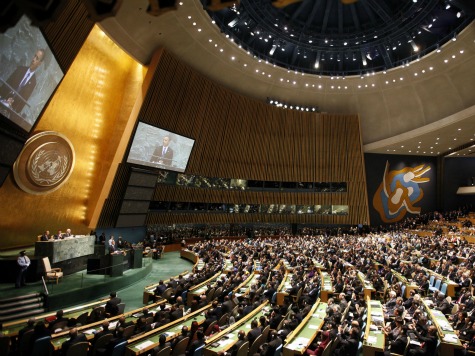
Today the General Assembly of the United Nations adopted a global gun control treaty called the Arms Trade Treaty. Now the fight begins here at home. There are several things gun owners need to know to protect their constitutional rights.
Now that it’s been proposed, the treaty goes to all the member states to decide on whether to join. Per the U.S. Constitution, in America it must first be signed by the president (which it will), then be ratified by two-thirds of the U.S. Senate (which it won’t). The United States is not likely to join the treaty as a nation, though President Barack Obama will likely push for it.
The General Assembly can’t do anything at the United Nations except propose (not establish) treaties and admit new U.N. members. Most of the power at the U.N. is in the Security Council, which consists of five permanent members (including the U.S.) and ten rotating seats among all the other U.N. members. So the General Assembly did one of the only things it can by recommending this treaty to its member states.
However, the first danger is that U.S. courts have held we’re bound by “customary international law,” sometimes called the “law of nations.” If enough U.N. member states were to adopt this treaty, a liberal federal court could rule it has become customary international law. The current Supreme Court would never affirm such a ruling, but there is a real danger if Obama changes the balance of the Court over the next three years.
Because federal statutes and treaties are of equal force under the U.S. Constitution, whenever they are in direct conflict, the most-recently passed of the two prevails. So, if somehow this treaty were ratified by the Senate, if Congress were to later pass a statute taking the opposite position, it would trump the treaty.
Of course, you need a president’s signature to pass a statute or two-thirds of Congress to override a presidential veto, so we would need a president in 2016 who supports the Second Amendment to pass such a law.
And if we have such a president, you don’t even need a statute. The Supreme Court has repeatedly held that a president’s primary authority in directing foreign affairs under the Constitution means that any president can withdraw us from any treaty. If we elect a pro-Second Amendment president, he can just rescind our participation in the Arms Trade Treaty and can literally strike Barack Obama’s signature from the treaty paper.
Speaking of the Supreme Court, it’s our last resort. As the Supreme Court has repeatedly held, Congress cannot do by treaty anything that would be unconstitutional if it were a statute. Treaties have no more power than statutes.
So a pro-gun majority on the U.S. Supreme Court can strike down this treaty, just as they could an unconstitutional federal law. Such a thing would not happen unless the treaty was used to make some sort of major gun grab, but it’s still a tool in our arsenal if this treaty is used to violate the Second Amendment rights of the American people.
The dangers are obvious, however. If Barack Obama manages to get an anti-gun politician like Hillary Clinton or Andrew Cuomo to follow him in 2016 as president, and changes the balance of the Supreme Court over time, then the Arms Trade Treaty could open America up to a worldwide U.N. gun control regime. That could lay the groundwork and set up a system that a decade or two from now could restrict lawful firearm ownership in this nation.
That must never happen. Second Amendment supporters need to step up, get involved in the electoral process, and make 2014 and especially 2016 banner years for supporters of the Constitution. The right to bear arms may depend on it.
Breitbart News legal columnist Ken Klukowski is on faculty at Liberty University School of Law.

COMMENTS
Please let us know if you're having issues with commenting.